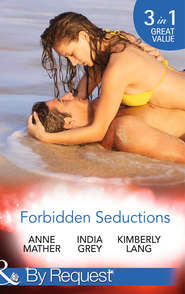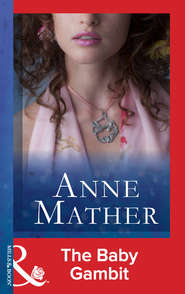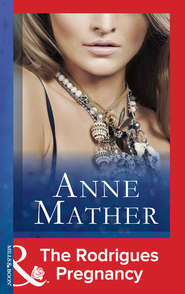По всем вопросам обращайтесь на: info@litportal.ru
(©) 2003-2024.
✖
Images Of Love
Автор
Год написания книги
2018
Настройки чтения
Размер шрифта
Высота строк
Поля
‘You know we’re spending tonight in Castries,’ he reminded her, mentioning the name of the island capital of St Lucia, the nearest large island to Emerald Cay, but Tobie was still apprehensive.
‘Why—why should we have to talk about—about your half-brother?’ she persisted, circling her dry lips with her tongue, and with a sigh Mark relaxed back in his seat.
‘I’ve been trying to think of a way to explain him to you,’ he confessed, unknowingly supplying the reason why Tobie had thought he had been unusually silent during the flight. ‘Rob—well, Rob can be a law unto himself, and it isn’t always enough just to put it down to his artistic temperament.’
Tobie’s palms smoothed the arms of her seat. ‘No?’
‘No.’
She hesitated. ‘You’re—you’re saying—he’s conceited?’
‘Hell, no!’ Mark was swift to deny this. ‘No one could call my brother conceited. But he can be rude—ignorant—bloody-minded, if you like. He—well, he doesn’t always mince his words.’ He sighed. ‘He used not to be like that. I mean,’ he hastened on quickly, ‘he never suffered fools gladly, if you know what I mean, but since the accident—’
Tobie drew in an unsteady breath. ‘I thought he got over that.’
‘He did.’ Mark sighed again. ‘At least, as well as anyone could who was left in a wheelchair—’
‘A wheelchair!’ Tobie was all attention now, turning to stare at him with wide disbelieving eyes. ‘Robert’s disabled!’
‘Don’t use that word to him, honey, will you?’ Mark advised her gently. ‘It’s not the sort of term you use where my brother is concerned. He’s not an invalid, or so he says, he’s only—somewhat incapacitated.’
Tobie could feel all the colour draining out of her face, and it was all she could do not to turn to Mark and beg him to take back his words. But she could say nothing. So far as Mark was concerned, she had not even met his brother, and although his revelation was both terrible and shocking, she must somehow sustain it without giving in to the shaking disbelief that gripped her. Yet she could hardly think straight as images of the man he had been flashed before her eyes. Robert—in a wheelchair! Robert—without the use of his legs! Robert, who had loved walking and driving, swimming and dancing …
‘I know it’s not generally known, that’s why I wanted to warn you.’ Fortunately Mark had warmed to his subject, and was paying her scant attention at the moment. ‘That was Rob’s idea, of course. If there’s one thing he can’t stand, it’s sympathy, and you can imagine the worldwide reaction if it was discovered that Robert Lang had been crippled in a car crash. That was why he bought Emerald Cay, why he’s dropped his public image. Not because he wanted to devote more time to his painting.’
Tobie felt totally drained of energy. Her whole body had slumped in her seat, and even her ankles felt weak. She couldn’t believe it; she simply couldn’t believe it. It explained so many things, and yet left so many others unexplained.
‘Anyway, it’s not so bad now,’ Mark added thoughtfully. ‘I mean, he still has the wheelchair around, but it’s not his only means of getting about. He manages pretty well on sticks these days. Not that he advertises that fact either. It’s a bit of a struggle, if you know what I mean, and like I said, Rob hates sympathy.’
Then, as if just realising that after her first horrified reaction Tobie had said nothing, he half turned towards her, grimacing when he saw her white face.
‘Hey,’ he exclaimed generously, ‘there’s no need for you to feel so badly, honey. I know you’re a fan of his and all, but really, it hasn’t affected his work, and that’s the important thing, isn’t it? You’ve seen his latest exhibition. His talent’s still as great as it ever was.’
Tobie knew she had to say something, but the words were so hard to articulate. ‘It—I—you should have told me sooner, Mark,’ she got out at last. ‘I—I don’t know what to say.’
‘Does it matter?’ Mark made a sound of impatience. ‘Come on! It’s nothing to do with us, is it? I just didn’t want you to—well, say something you might regret.’
‘Regret?’ Tobie echoed weakly, wishing suddenly that she had listened to Laura.
‘Seeing him in a wheelchair for the first time,’ Mark explained softly. ‘I don’t want you to be hurt. And Rob can be so damned sarcastic to people who show any sign of compassion!’
‘Can he?’
Tobie felt totally incapable of handling the situation. She only knew that if she had known about this before leaving London, she would never have agreed to come. She didn’t know why exactly. It didn’t change anything, so far as she and Mark were concerned. But somehow her presence seemed ghoulish now, an unwanted and unwarranted reminder of the past; and while she admitted that her feelings for Robert had died on the operating table more than three years ago, she was loath to arouse emotions that could only cause him bitterness.
‘You knew about the accident,’ Mark probed now, and she managed to nod. It would have been foolish to state otherwise. It had been in all the papers, and as Mark had said, she was a fan. ‘Anyway, it all happened a long time ago,’ he reassured her, and she guessed his patience was wearing a little thin. ‘There’s no reason for you to get upset about it. It was his own fault. He was driving too fast as usual. That damned car of his—’ He shook his head. ‘Who needs a car that can do nearly two hundred miles an hour on roads where the speed limit is seventy?’
Tobie swallowed convulsively. ‘Some—some people like fast cars,’ she offered feebly, remembering the Porsche only too well. She remembered, too, the reason he had been driving fast, and that last terrible row before he left her …
‘If you had to patch them up afterwards, perhaps you wouldn’t speak so carelessly,’ Mark remarked now, his tone full of indignation. ‘We see them all at the hospital. Young men, girls, kids, most of them, with too much power under the bonnet and too little grey matter in their skulls. Losing a leg or an arm, or their sight. And they’re the lucky ones. Paralysis is the most likely result, and believe me, it’s not a pretty sight.’
Tobie shook her head. ‘I—I didn’t mean—’
‘I know you didn’t.’ Mark’s smile suddenly illuminated his fair handsome face. ‘I guess Rob’s accident happened around the time we first met, didn’t it? And at that time you were in no fit state to be aware of anyone’s troubles but your own.’
No fit state …
Hysteria swelled inside her. If he only knew, she thought sickly. If he ever found out …
‘Not that I was involved with his recovery,’ Mark continued. ‘He wasn’t a patient of mine.’ He shrugged. ‘There was one consolation, though. It did bring him and my mother together again. You don’t know this, but before the accident they were a little less than close!’
Tobie bent her head. She wondered how Mark would react if she told him that she had known that. That in fact she had been staggered when she learned that after all that Robert had told her about his mother, he had actually forgiven her at last. He had always maintained that would never happen. But circumstances alter cases, she thought unsteadily, the weight of what she had learned bearing heavily on her.
‘So …’ Mark’s smile appeared again, ‘I’ve told you. I knew I’d have to, but—well, it’s not easy, destroying an ideal.’
An ideal! Tobie turned to stare out of the window, and as she did so, the stewardess advised the passengers to fasten their safety belts and put out their cigarettes ready for landing at Hewanorra airport. Was that how Mark imagined she thought of his brother? How differently he would have felt if he had known the truth. And how differently might she have reacted if she had suspected that Robert had not made a complete recovery?
The hotel in Castries was air-conditioned and very comfortable, and Tobie had no objections when Mark suggested that they rested for a couple of hours before dinner. It had been a long flight, and a long drive, and although it was only early evening in the Caribbean, her body told her it was much later in London.
Mark had booked adjoining rooms, but as yet he had not tried to force their relationship. He wanted to make love to her, she knew that, but being a doctor, he was also aware of the reasons why she had refused to allow him to do so. Since Robert, since the emotional impact of what had happened to her, she found it incredibly difficult to relate to any man in a physical way, and Mark was sensible enough to see that if he compelled her to respond to him, he might destroy the tenuous thread he had constructed. So they remained friends, but not lovers in the true sense of the word, and Tobie believed they were closer than she and Robert had ever been.
Lying on her bed, however, with the blinds drawn against the lighted street outside, and the steady hum of the hotel drifting irresistibly to her ears, she found it impossible to relax. Everything Mark had told her went round and round in her head, until she felt almost dizzy with the perplexity of her thoughts. Robert was an invalid, or he was crippled, at least. All those nightmares she had had during her illness, the women she had used to torment herself he was spending his nights with, had only existed in her imagination. She could understand why Mark had felt it necessary to warn her about the uncertainty of his moods. Robert had always been an arrogant devil, and even now she found it almost impossible to picture him any other way.
She remembered the first time she had met him, when he came striding into the gallery where she worked. Her boss, Vincent Thomas, was staging one of his exhibitions, but she had not known that the tall lean stranger in the shabby denim shirt and jeans was Robert Lang. All she had seen was a man in his early thirties, a dark man, with untidy black hair, and skin with an olive cast. She had at first taken him for an intruder, not altogether trusting the way his dark eyes had swiftly appraised the layout of the gallery, and the general accessibility of the paintings, half suspecting he was checking the place out with criminal intent. Even when the dark eyes turned in her direction, and she found her own body betraying the dictates of her common sense, she was loath to admit that she found him disturbing, but when he spoke she was incapable of voicing any reproof. Robert had an attractive voice, low and mellow, with just a hint of the humour he had possessed in such measure, providing a lighter tone. And her nervousness had amused him, she had known that, even before he spoke to her and asked her who she was.
She had answered him. How could she not? She was in charge of the gallery in Vincent’s absence, and for all she knew, this man might be a valued customer. But when it became apparent that he was more interested in her than the paintings, she had made a polite withdrawal, leaving him to browse around alone.
He was gone before Vincent returned, and although she knew she ought to mention the suspicious circumstances of his visit, she was curiously unwilling to do so. Instead she kept the encounter to herself, and worried herself sick that night in case there should be a break-in.
The following afternoon he was waiting for her when she left her office. She hardly recognised him in a well cut navy lounge suit, but when she did, she was astounded at his audacity. All her earlier doubts returned, and she convinced herself he intended to incriminate her in some plot to rob the gallery.
His suggestion that she joined him for a drink before going home both excited and frightened her. She wanted to go with him, she knew that, but she also believed she was playing with fire, though how much, she had yet to learn.
In the event, she had agreed to accompany him to a club nearby, the exclusiveness of its clientele only occurring to her when she was seated on a plush stool at the bar. It was difficult to think of anything with his dark eyes playing lazily over her face, lingering longer than was necessary on her mouth, before returning to tantalise the darting uncertainty of hers. She had never met anyone quite like him before, and her lips twisted now when she remembered how na?ve she must have seemed.
‘Tell me about yourself,’ he prompted, when she had taken possession of a tall glass of Campari soda—her choice, not his—and she had found herself explaining that although she had been born in Northumberland, since her parents’ death two years ago she had been living with her married sister, Laura, in Wimbledon.
‘And you’ve worked at the gallery how long?’ he probed, studying her expression, and she admitted she had only been there a little over six months, having spent her first year in London, taking a secretarial course.
‘I thought I hadn’t seen you there before,’ he remarked, surprising her, and Tobie thought it was time she asked some questions of her own.
‘What—er—what do you do, Mr—Mr—’ she had begun awkwardly, realising she didn’t even know his name, and his dark brows had drawn together aggressively.
‘You mean you don’t know?’ he asked, his expression coldly sceptical, and she had had her first glimpse of another side to his character.
‘No,’ she insisted, glancing uneasily about her. ‘Why should I?’
Robert had looked at her sharply, as if gauging her sincerity, and then, without provocation, he demanded: ‘So what the hell are you doing, accepting invitations from strange men? Didn’t that sister of yours tell you anything?’











